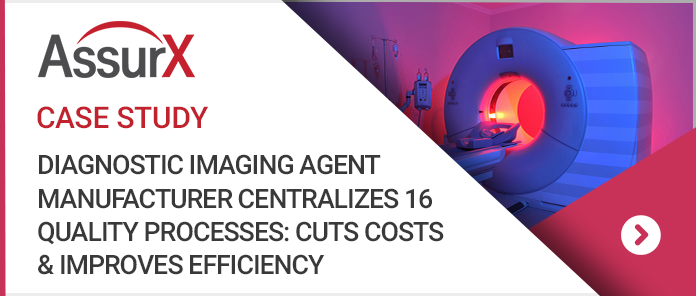September 22, 2022
Data integrity is a cornerstone of U.S. Food and Drug Administration (FDA) current good manufacturing practices (cGMP) regulations. Pharmaceutical manufacturers must ensure data is reliable and accurate, following data integrity requirements in CFR parts 211 and 212.
However, FDA data integrity guidance notes a “troubling” increase in cGMP violations related to data integrity in recent years. For manufacturers, this has led to FDA warning letters, import alerts and other enforcement actions like consent decrees.
How can manufacturers protect data integrity so drugs meet regulatory standards around safety, identity, strength, quality, and purity? This article explores what the FDA means by data integrity, what manufacturers must know about ALCOA+, and where these principles apply.
What Is ALCOA+ in Data Integrity?
The FDA defines data integrity as “the completeness, consistency, and accuracy of data.” The concept of data integrity is based on ALCOA principles, where data should be attributable, legible, contemporaneous, original, and accurate. In recent years, the agency expanded this to ALCOA+, for data that is complete, consistent, enduring, and available.
Understanding ALCOA+ Principles
Following ALCOA+ principles is key to drug safety and avoiding FDA compliance issues. It prevents data from being changed, falsified, or deleted, protecting the validity of data and minimizing findings during FDA inspections.
What exactly does the FDA expect from pharma manufacturers? Below we take a look at ALCOA+ principles to understand more. It’s important to note that these principles apply to all types of cGMP records, including paper records, electronic records, images or photography, and hybrid records.
- Attributable: You should be able to trace data back to the person or computer system who generated the data.
- Legible: Data must be clearly readable and permanent.
- Contemporaneous: Companies should record data at the time the work is done.
- Original or a true copy: Original data refers to where data is recorded for the first time, whether in an official lab notebook or computer file. True copies are those that have been verified and labeled as such.
- Accurate: For data to be accurate, it must be complete, consistent, and representative of facts. In addition, corrections must include a record of any changes as well as justification for the change.
- Complete: Complete data includes all the information required to reconstruct events, including documentation of any repeat testing or reanalysis.
- Consistent: Data should follow a consistent format in terms of how it is recorded and time-stamped.
- Enduring: Manufacturers must maintain data so that it’s intact for the required retention period.
- Available: Data must be accessible throughout the data retention period.
Data Integrity Issues in Paper Records
When it comes to paper records such as lab notebooks, legibility is of primary importance. In many cases, technicians record initial results and calculations in notebooks, entering results afterward in the quality management system (QMS).
Legibility is important for ensuring data entered in the laboratory information management system (LIMS) or QMS is accurate. In addition, transcription mistakes can impact patient safety. Furthermore, clear records are critical to reconstructing events.
To prevent FDA citations, manufacturers must take several steps to ensure data integrity in these paper records. To begin, the quality unit must review all lab notebooks for legibility and completeness. The quality unit must stamp all lab notebooks for official use so they can identify any unofficial notebooks or gaps in pages.
Companies can issue numbered sets of blank forms as necessary, reconciling complete forms and retaining incomplete or erroneous forms. Further, the record must also contain justification for why you replaced any forms.
Verifying transcription is also crucial. One lab received a warning letter recently after a technician knowingly falsified data by entering arbitrary values into the computer system.
Finally, it is vital to have a policy forbidding employees from taking notes on scrap paper. The risk is that the results won’t make it to official notebooks, or won’t be transcribed correctly. Furthermore, what’s transcribed in the notebook is no longer original data.
How an Enterprise QMS Promotes ALCOA+ Principles
While lab notebooks still play a role in many pharmaceutical companies, the transition to digital systems is essential to strengthening data integrity. An enterprise QMS supports ALCOA+ principles in many ways, including:
- Automatically creating audit trails that provide a secure, time-stamped record of the creation, modification, or deletion of records
- Generating metadata for all QMS records that includes the user ID of the person who generated the data
- Preventing unauthorized modification of data with user-based permissions for who can view and edit specific data fields
- Making it simpler to reconstruct past events and results, even when the person who generated the data is no longer with the company
- Restricting access to cGMP computer systems and preventing the use of shared logins
- Facilitating and documenting the review of audit trails to ensure cGMP compliance
- Providing electronic signatures to streamline review and submission of records
Conclusion
Poor data integrity can have serious consequences for pharma companies. These include FDA enforcement actions, recalls, shutdowns, and denied drug approvals, not to mention potential reputational damage.
Document control practices for paper records are essential, given the realities of laboratory operations today. At the same time, implementing a digital QMS provides added controls to minimize data integrity issues common with manual tracking. Not only can the QMS streamline interactions with regulators and minimize inspection findings, it can provide a higher level of reliability in products.
Related Reading: Effectively Managing Data Integrity for CGMP
About the Author
Stephanie Ojeda is Director of Product Management for the Life Sciences industry at AssurX. Stephanie brings more than 15 years of leading quality assurance functions in a variety of industries, including pharmaceutical, biotech, medical device, food & beverage, and manufacturing.



